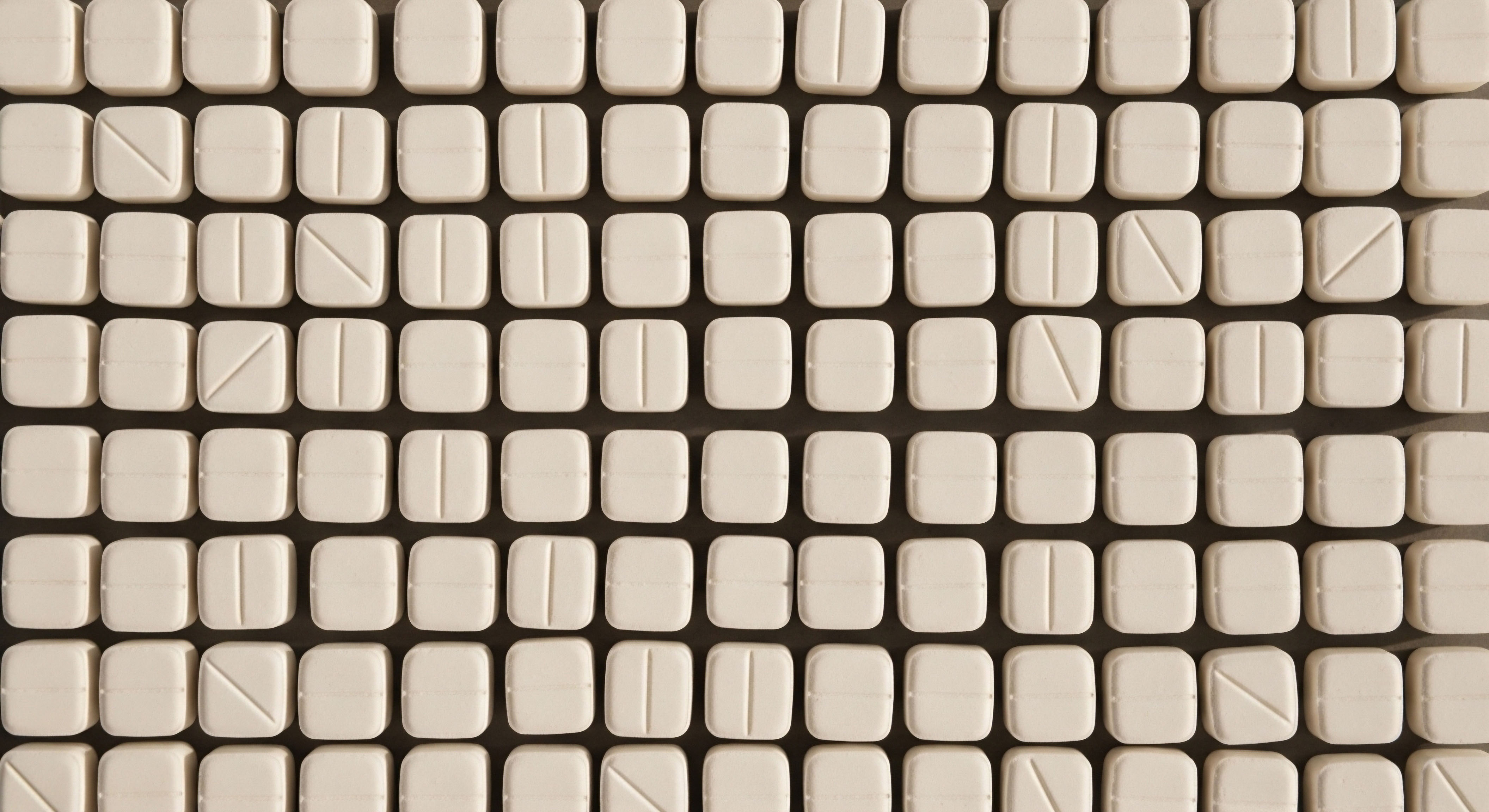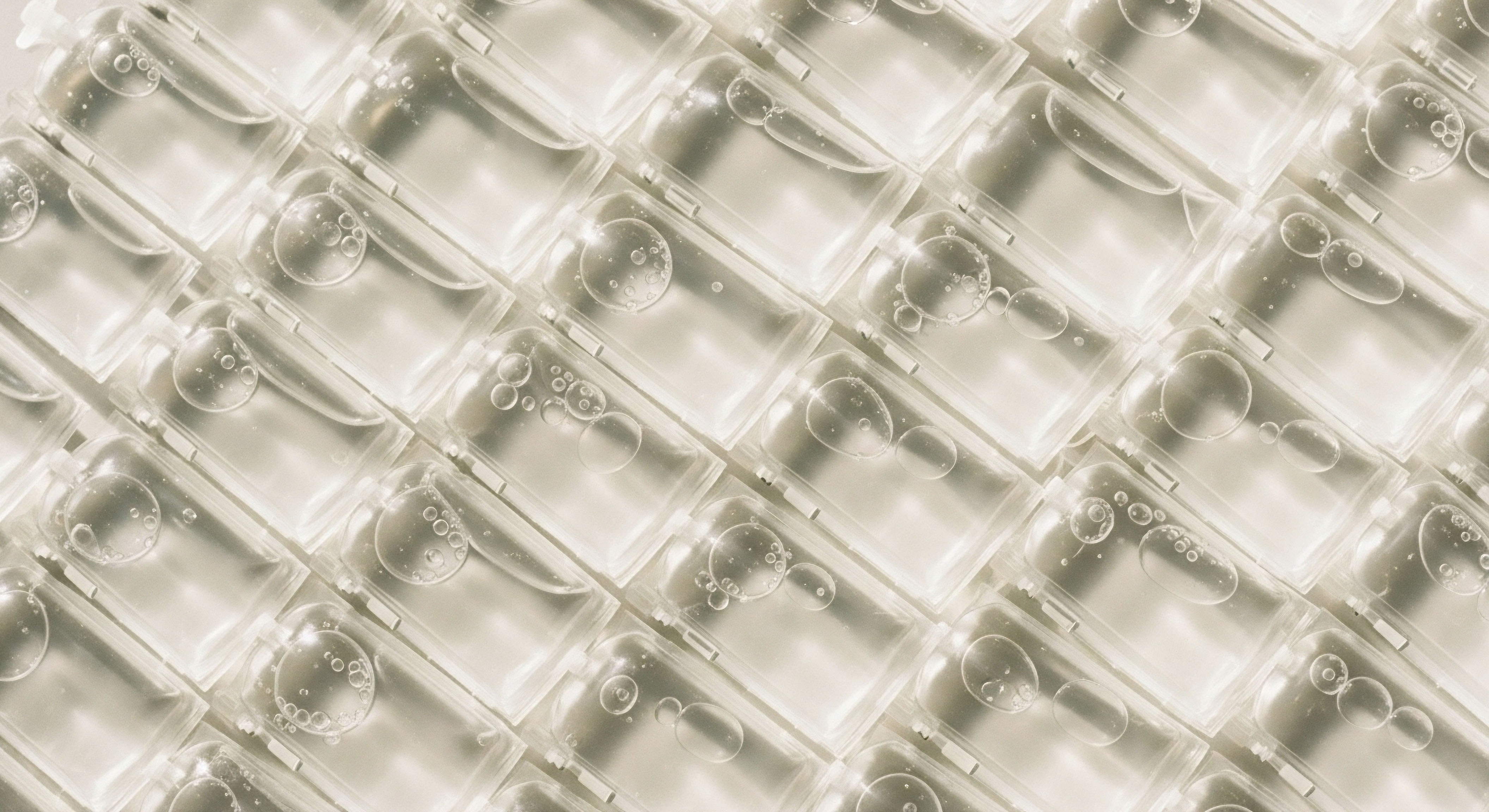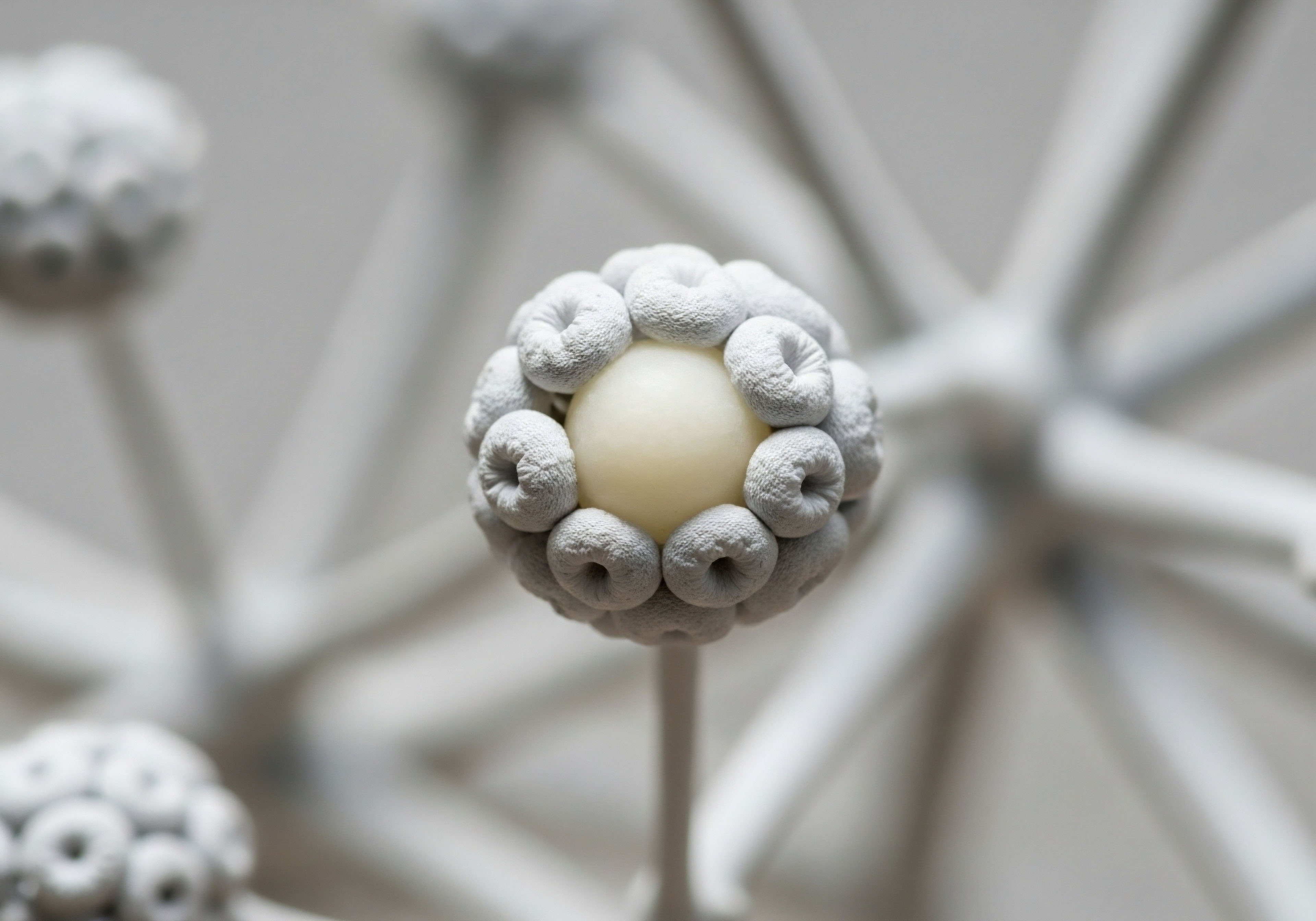

Fundamentals
You feel it in your bones, a deep-seated exhaustion that caffeine no longer touches. The energy that once defined your days has been replaced by a persistent fog, your focus is scattered, and your body simply feels out of sync. These feelings are valid and deeply familiar to many.
They are the subjective language of a biological system calling for attention. Often, we attribute these experiences solely to the hormonal shifts of age, looking to replacement therapies as the complete solution. The truth resides in a more interconnected biology, where the quality of your nightly rest acts as a powerful regulator of your entire endocrine system.
Optimizing sleep fundamentally enhances your body’s ability to produce and utilize its own hormones, which can directly influence the effectiveness and required dosage of any hormonal support you may undertake.
Your body operates on an internal clock, a sophisticated circadian rhythm that governs countless physiological processes. This rhythm dictates the rise and fall of key biochemical messengers. As darkness falls, your brain releases melatonin, signaling the body to prepare for rest.
Simultaneously, levels of the stress-adaptive hormone cortisol should be at their lowest, allowing you to descend into restorative sleep. Throughout the night, particularly during the deep, slow-wave stages, your pituitary gland releases pulses of growth hormone, essential for cellular repair and regeneration.
In men, the majority of daily testosterone production is linked to these same deep sleep cycles. This nightly orchestration is a foundational element of vitality. When sleep is fragmented or insufficient, this entire symphony is disrupted. Cortisol may remain elevated into the evening, preventing deep rest and suppressing the very hormonal cascades that sleep is meant to trigger.
Restorative sleep is an active state of hormonal maintenance, directly influencing your body’s endocrine balance and resilience.
Consider the endocrine system as your body’s internal communication network, using hormones as chemical messengers to transmit vital instructions between organs and tissues. Sleep is the master conductor of this network. It ensures the messages are sent at the right time, in the right sequence, and with the right intensity.
A night of poor sleep is akin to introducing static into this communication system. The signals become garbled. The production of key hormones like testosterone and growth hormone is attenuated, while the presence of disruptive molecules like excess cortisol and inflammatory cytokines increases.
This disruption creates a physiological environment that mirrors, and can significantly worsen, the very symptoms of hormonal decline you might be experiencing, such as fatigue, low mood, and cognitive difficulties. Understanding this relationship is the first step in reclaiming control over your biological function. It reframes the conversation from merely replacing what is lost to restoring the system that governs it all.

The Architecture of Hormonal Health
The structure of your sleep, known as sleep architecture, is profoundly linked to hormonal regulation. Your night is composed of several cycles, each containing different stages with unique biological functions.
- Deep Sleep (Slow-Wave Sleep) ∞ This is the most physically restorative phase. During these periods, the brain produces large, slow delta waves. It is within this state that the pituitary gland is most active in releasing growth hormone, which is critical for tissue repair, muscle growth, and overall cellular health. The integrity of this sleep stage is paramount for physical recovery and maintaining metabolic balance.
- REM Sleep ∞ Characterized by rapid eye movement and active brainwaves, this stage is vital for cognitive function, emotional regulation, and memory consolidation. Research indicates that fragmented sleep, particularly with disruptions to REM, can blunt the nocturnal rise in testosterone.
- Light Sleep ∞ These initial stages serve as the gateway to deeper sleep. While less restorative than deep or REM sleep, their consistency is important for progressing through the necessary cycles throughout the night.
A healthy night’s sleep involves cycling through these stages multiple times. Disruptions from factors like stress, noise, or metabolic issues can prevent you from spending adequate time in the deep and REM stages, directly impairing the hormonal processes that depend on them. This creates a state where your body is less prepared to manage daily stressors and less efficient at repair and regeneration, contributing to the symptoms of hormonal imbalance.


Intermediate
When you begin a hormonal optimization protocol, the goal is to restore physiological balance and alleviate symptoms. The dosage of therapies like Testosterone Replacement Therapy (TRT) or Growth Hormone Peptide Therapy is carefully calculated based on your lab results, symptoms, and clinical presentation.
What is often an unmeasured variable in this equation is the state of your sleep. Chronic sleep deprivation creates a significant physiological headwind, forcing your body to work much harder to achieve equilibrium. This state of internal stress can render your cells less sensitive to the very hormones being administered, potentially necessitating higher therapeutic doses to achieve the desired clinical effect. By addressing sleep quality, you are preparing the terrain, making your body more receptive to biochemical recalibration.
For instance, a man experiencing symptoms of low testosterone, such as fatigue and low libido, might present with suboptimal lab values. If he also has poor sleep, his endogenous testosterone production is already suppressed. His symptoms are a product of both his underlying hormonal status and his sleep deficit.
Initiating TRT without addressing the sleep component may require a higher dose of testosterone cypionate to overcome the compounded deficit. Conversely, by implementing rigorous sleep hygiene, he can maximize his natural production rhythm, reduce the catabolic influence of excess cortisol, and improve his body’s sensitivity to the exogenous testosterone.
This integrated approach allows the therapeutic protocol to work with the body’s natural processes, often leading to better outcomes with a more conservative dosage. The same principle applies to women undergoing hormonal support for perimenopause, where improved sleep can help stabilize cortisol and progesterone pathways, easing the transition.
Improving sleep quality can enhance cellular sensitivity to hormones, potentially allowing for a lower, more efficient therapeutic dose.

How Can Sleep Quality Affect Hormone Therapy Outcomes?
The interaction between sleep and hormonal therapies is complex. Poor sleep acts as a systemic stressor, influencing multiple pathways that determine how your body responds to treatment. Restoring healthy sleep patterns can create a cascade of positive physiological changes that support your protocol.
The table below outlines the direct impact of sleep quality on key hormones and related biomarkers, illustrating why optimized sleep is a critical component of any endocrine support strategy.
| Hormone/Biomarker | Impact of Poor Sleep (Fragmented/Short Duration) | Impact of Optimized Sleep (7-9 Hours, Consistent) |
|---|---|---|
| Testosterone |
Decreased nocturnal production; daytime levels can drop by 10-15% after just one week of restriction. |
Supports the natural diurnal rhythm, with peak production occurring during deep sleep cycles. |
| Growth Hormone (GH) |
Suppressed release, as the primary pulse is tied to the first deep sleep cycle. |
Maximizes the natural, sleep-dependent release, aiding in tissue repair and metabolic health. |
| Cortisol |
Elevated evening and nighttime levels, which disrupts sleep architecture and promotes a catabolic state. |
Promotes the natural decline of cortisol in the evening, allowing for restorative sleep and reducing systemic stress. |
| Insulin Sensitivity |
Significantly reduced, leading to higher circulating glucose and insulin levels. |
Improves cellular sensitivity to insulin, supporting stable blood sugar and reducing metabolic stress. |
| Inflammation (e.g. IL-6) |
Increased levels of pro-inflammatory cytokines, contributing to systemic inflammation. |
Helps regulate the immune response and lowers baseline levels of inflammation. |

Actionable Protocols for Restoring Sleep
Improving your sleep involves a conscious and consistent effort to signal to your body that it is time to wind down. This goes beyond simply going to bed earlier; it requires creating an environment conducive to deep, uninterrupted rest.
- Create A Sanctuary ∞ Your bedroom should be reserved for sleep and intimacy. This means removing televisions, work laptops, and other electronic devices that emit blue light and are associated with wakefulness. The ideal sleep environment is cool, dark, and quiet. Consider blackout curtains, a white noise machine, or earplugs to minimize disruptions.
- Establish A Wind-Down Routine ∞ In the 60-90 minutes before your desired bedtime, engage in calming activities. This could include reading a physical book, taking a warm bath with Epsom salts, gentle stretching, or practicing meditation or mindfulness exercises. This period helps lower cortisol and signal the brain to begin producing melatonin.
- Manage Light Exposure ∞ Light is the most powerful regulator of your circadian rhythm. Expose yourself to bright, natural light as early as possible in the morning. Conversely, dim the lights in your home in the evening and avoid screens. If screen use is unavoidable, use blue-light-blocking glasses.
- Be Mindful of Stimulants and Sedatives ∞ Avoid caffeine after noon, as its effects can linger in your system for many hours. While alcohol may induce sleepiness, it significantly disrupts sleep architecture later in the night, particularly REM sleep.
Implementing these strategies consistently can profoundly impact your hormonal health, creating a more stable and receptive internal environment for any therapeutic protocols you may be using.


Academic
The proposition that sleep optimization can temper the required dosage of hormonal replacement therapies is grounded in the intricate neuroendocrine mechanisms governing metabolic health and steroidogenesis. A state of chronic sleep deprivation induces a significant and measurable dysregulation of the Hypothalamic-Pituitary-Adrenal (HPA) axis.
This system, designed for acute stress responses, becomes chronically activated. The result is a persistent elevation of circulating cortisol, particularly during the evening and nocturnal hours when it should be at its nadir. This elevated cortisol profile directly antagonizes the function of the Hypothalamic-Pituitary-Gonadal (HPG) axis, the central regulator of sex hormone production.
The constant “stress” signal from the hyperactive HPA axis can suppress the pulsatile release of Gonadotropin-Releasing Hormone (GnRH) from the hypothalamus, leading to a subsequent reduction in Luteinizing Hormone (LH) and Follicle-Stimulating Hormone (FSH) from the pituitary. This directly translates to attenuated testosterone production in the testes and disrupted estrogen and progesterone cycles in the ovaries.
This HPA-driven suppression creates a scenario where an individual’s baseline hormonal production is functionally impaired. When initiating a protocol like TRT, the prescribed dose must compensate for both the pre-existing hypogonadal state and the ongoing suppressive effects of poor sleep. The therapy is essentially fighting an uphill battle against a hostile biochemical environment.
By restoring healthy sleep architecture, the hyperactivity of the HPA axis is normalized. This allows the HPG axis to function with less interference, improving the baseline hormonal milieu and enhancing the body’s sensitivity to the administered hormones. The therapy then acts as a support to a better-functioning system, rather than a replacement within a dysfunctional one.
Sleep deprivation induces HPA axis hyperactivity, which directly suppresses HPG axis function and fosters a state of hormonal resistance.

What Is the Link between Sleep Insulin and Hormone Bioavailability?
The metabolic consequences of sleep deprivation are a key factor in hormonal efficacy. Elevated nocturnal cortisol and systemic inflammation stemming from poor sleep are potent drivers of insulin resistance. Even a few nights of restricted sleep can significantly impair glucose tolerance and reduce the sensitivity of peripheral tissues to insulin.
This state of hyperinsulinemia has a direct and critical impact on hormone bioavailability through its regulation of Sex Hormone-Binding Globulin (SHBG). SHBG is a protein produced primarily in the liver that binds to sex hormones, rendering them biologically inactive. Insulin is a primary suppressor of SHBG synthesis.
Therefore, the insulin resistance induced by sleep deprivation leads to lower SHBG levels. While this may seem to increase “free” hormone levels, it occurs within a context of systemic inflammation and cellular dysfunction, where receptors may be less responsive. The overall effect is a dysregulation of hormonal balance, contributing to the clinical picture of hormonal deficiency.
The following table details the cascading physiological effects that link poor sleep to compromised hormonal function at a molecular level.
| Trigger | Neuroendocrine Pathway | Metabolic Consequence | Clinical Implication for HRT |
|---|---|---|---|
| Sleep Deprivation |
Chronic HPA Axis Activation; Elevated Cortisol. |
Increased gluconeogenesis; development of insulin resistance. |
Worsens metabolic syndrome; requires careful management of metabolic health alongside hormonal therapy. |
| Insulin Resistance |
Hyperinsulinemia; Downregulation of SHBG synthesis. |
Lower total SHBG; altered free hormone fractions within a dysfunctional system. |
Complicates interpretation of lab values; the system is less able to buffer and transport hormones effectively. |
| Systemic Inflammation |
Increased pro-inflammatory cytokines (IL-6, TNF-α). |
Contributes to insulin resistance; may directly impair testicular and ovarian function. |
Creates a pro-inflammatory state that may reduce cellular responsiveness to hormone replacement. |
| HPG Axis Suppression |
Reduced GnRH, LH, and FSH pulsatility. |
Impaired endogenous steroidogenesis (testosterone, estrogen production). |
The underlying condition being treated is actively worsened, potentially necessitating higher therapeutic doses. |

Neuroinflammation and Steroidogenesis
Beyond the central axes, sleep loss promotes a state of low-grade systemic and neuroinflammation. Microglial cells in the brain become activated, and peripheral inflammatory markers rise. This inflammatory state can directly impair the function of steroidogenic enzymes within the gonads and adrenal glands.
The conversion of cholesterol into pregnenolone, the precursor to all steroid hormones, and subsequent enzymatic steps are metabolically demanding processes sensitive to oxidative stress and inflammation. An inflamed internal environment is less efficient at producing hormones. Therefore, optimizing sleep serves an anti-inflammatory purpose, protecting the very machinery of hormone synthesis. This creates a system that is not only more receptive to exogenous hormones but also more capable of producing its own.
- HPA Axis Dysregulation ∞ Chronic activation from sleep loss elevates cortisol, which suppresses the HPG axis and promotes a catabolic state.
- Insulin Resistance ∞ Elevated cortisol and inflammation impair insulin signaling, leading to hyperinsulinemia and subsequent suppression of SHBG.
- Inflammatory Cytokine Production ∞ Sleep deprivation increases levels of IL-6 and TNF-alpha, which contribute to insulin resistance and may directly impair gonadal function.
- Reduced Endogenous Production ∞ The combined effects of HPG suppression and inflammation lead to a diminished capacity for the body to produce its own steroid hormones, deepening the deficit that therapy must address.

References
- Cizza, G. et al. “Sleep, the hypothalamic-pituitary-adrenal axis, and cytokines ∞ Multiple interactions and disturbances in sleep disorders.” Endocrinology and Metabolism Clinics of North America, vol. 31, no. 1, 2002, pp. 15-36.
- Leproult, R. and E. Van Cauter. “Effect of 1 week of sleep restriction on testosterone levels in young healthy men.” JAMA, vol. 305, no. 21, 2011, pp. 2173-4.
- Buxton, O. M. et al. “Impact of five nights of sleep restriction on glucose metabolism, leptin and testosterone in young adult men.” PloS one, vol. 7, no. 7, 2012, e41218.
- Luboshitzky, R. et al. “Disruption of the nocturnal testosterone rhythm by sleep fragmentation in normal men.” The Journal of Clinical Endocrinology & Metabolism, vol. 86, no. 3, 2001, pp. 1134-9.
- Cagnacci, A. et al. “Effects of low-dose, continuous combined hormone replacement therapy on sleep in symptomatic postmenopausal women.” Maturitas, vol. 28, no. 2, 1997, pp. 141-7.
- Vgontzas, A. N. et al. “Impact of growth hormone replacement therapy on sleep in adult patients with growth hormone deficiency of pituitary origin.” The Journal of Clinical Endocrinology & Metabolism, vol. 91, no. 11, 2006, pp. 4407-12.
- Cho, J. W. et al. “The relationship between sleep disorders and testosterone in men.” The World Journal of Men’s Health, vol. 37, no. 2, 2019, pp. 141-151.
- Mullington, J. M. et al. “Sleep loss and inflammation.” Best practice & research. Clinical endocrinology & metabolism, vol. 24, no. 5, 2010, pp. 775-84.
- Nilsson, P. M. et al. “Sleep disturbance in association with metabolic syndrome.” Obesity Reviews, vol. 10, no. S1, 2009, pp. 58-65.
- Novelli, L. et al. “Neuroinflammation, sleep, and circadian rhythms.” Comprehensive Physiology, vol. 9, no. 3, 2019, pp. 1163-1190.

Reflection

Your Biology Your Blueprint
The information presented here offers a biological framework for understanding your body’s intricate systems. The symptoms you experience are real, and they are rooted in a complex interplay of chemistry and physiology. The path to reclaiming vitality begins with recognizing that your daily choices, particularly how you prioritize rest, are powerful tools in your health arsenal.
The knowledge that sleep quality can fundamentally alter your hormonal landscape is empowering. It shifts the focus from a passive reliance on a prescription to an active partnership with your own biology. Consider your own patterns. Where in your daily life can you create space for restorative rest? Viewing sleep as a non-negotiable act of biological maintenance is the foundation upon which all other wellness protocols can be built, allowing you to function with renewed energy and clarity.

Glossary

endocrine system

growth hormone

cortisol

deep sleep

poor sleep

sleep architecture

testosterone replacement therapy

growth hormone peptide therapy

potentially necessitating higher therapeutic doses

sleep deprivation

perimenopause

sleep quality

systemic inflammation

steroidogenesis

hpa axis

hpg axis

insulin resistance

sex hormone-binding globulin

potentially necessitating higher therapeutic

neuroinflammation




